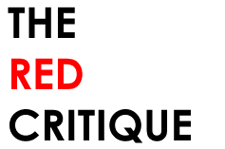
17
![]() Dossier on Gaza
Dossier on Gaza
In the Case of Gaza
Rob Wilkie
The Left Travesty on Gaza
Stephen Tumino
The Poverty of (Post)Humanities
Teresa L. Ebert
Speaking
Internationalism: Class Difference in Writerly Cosmopolitics
Amrohini Sahay
Jameson's Spiritual Reawakening: Labor Theory in the Time of
Wal-Mart
Robert Faivre
Naturalism is not Materialism:
Spinoza, New Materialism and the Left
Kimberly DeFazio
Beyond In-between Feminism: Martha
E. Gimenez and Capitalist Social Reproduction
Julie Torrant
This issue of The Red Critique includes a collection of essays that have appeared in "scholarly" journals. They foreground class analysis at a time when "value form" analysis of capital has become the overriding question in reform-al left social theory. In different versions and in diverse vocabularies, "value form" theories absorb class in their critique of, not by, labor and displace the conflicts of forces and social (property) relations—that "begins an epoch of social revolution"—with conflicts in the spectral objectivity of "value" which is assumed to be validated in exchange. Exploitation is shifted to domination and domination is represented as an impersonal (post-class) social compulsion exerted by abstract time.
The dossier on Gaza puts class back in social analysis at the same time that the reform-al left has displaced class analysis, as in Judith Butler's comments on Gaza, with the melodrama of grief or, on the other end of left politics, with a stand-up comedy that absorbs class in snickers, as in Zizek's smirk realism: "I would like to have a modest, realist left which has positive proposals of what to do. Like, OK, to talk frankly, we cannot obviously step out of capitalism. How to deal with it?"
"Dealing with" accepts what is as unalterable. The dossier on Gaza is a critique of the (seemingly) unalterable is—critique is the negative that dissolves "the hitherto existing world order to contribute to a "world which is coming into being."


